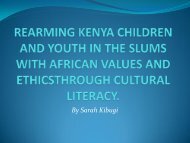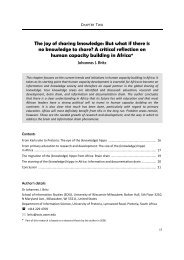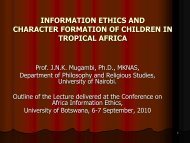<strong>Information</strong> <strong>Ethics</strong> <strong>in</strong> the <strong>Africa</strong>n Contextno less than Sigmund Freud, was well aware of the limits of human will and our tendency to repressor forget what we consider pa<strong>in</strong>ful. The Egyptian god Thot is a symbol of cultural memory as a socialtask. He is the god of wisdom and writ<strong>in</strong>g, as well as messenger of the gods, particularly of the sungod Re, and is associated with the goddess Ma’at, the personification of justice. Thot, the GreekHermes, was represented as an ibis- (or a baboon-) headed man with a reed pen and a palette,known <strong>in</strong> the Western tradition through Plato’s criticism of writ<strong>in</strong>g <strong>in</strong> his Phaedrus.To retrieve the <strong>Africa</strong>n cultural memory with regard to <strong>in</strong>formation and communication normsand traditions is the ma<strong>in</strong> <strong>in</strong>formation challenge for <strong>Africa</strong>n <strong>Information</strong> <strong>Ethics</strong>. It should recognise thedifferent strategies of social <strong>in</strong>clusion and exclusion <strong>in</strong> the history of <strong>Africa</strong>n societies, <strong>in</strong>clud<strong>in</strong>gtraumatic experiences such as slavery and apartheid. S<strong>in</strong>ce the emergence of the Internet, thischallenge is discussed under the head<strong>in</strong>g of the digital divide. However, <strong>Africa</strong>n <strong>Information</strong> <strong>Ethics</strong>implies much more than just the access and use of this medium. The problem is not a technical one,but one of social exclusion, manipulation, exploitation, and annihilation of human be<strong>in</strong>gs. It is vital that<strong>Africa</strong>n <strong>Information</strong> <strong>Ethics</strong> be developed from this broader perspective.There is a short and a long history of <strong>Information</strong> <strong>Ethics</strong> <strong>in</strong> <strong>Africa</strong>. The long history concerns<strong>Africa</strong>’s rich oral and written traditions, throughout many centuries, about different k<strong>in</strong>ds of <strong>in</strong>formationand communication practices, us<strong>in</strong>g different moral codes and media, and based on dynamic andcomplex processes of cultural hybridisation. Critical reflection on this history promotes greaterawareness of <strong>Africa</strong>’s cultural legacy, which provides the foundations of the digital <strong>Information</strong> andCommunication Technologies that will create unique and genu<strong>in</strong>ely <strong>Africa</strong>n <strong>Information</strong> Societies forthe future. <strong>Information</strong> <strong>Ethics</strong> opens a space for the critical reflection on established customs andvalues. It works as a catalyst for social change. It is a space for retriev<strong>in</strong>g the rich <strong>Africa</strong>n culturalmemory that allows the reshap<strong>in</strong>g of <strong>Africa</strong>n identities and contributes to the world’s <strong>in</strong>formation andcommunication cultures.ReferencesANIE (<strong>Africa</strong>n Network for <strong>Information</strong> <strong>Ethics</strong>). Retrieved January 3, 2013, fromhttp://www.africa<strong>in</strong>foethics.org.<strong>Africa</strong>n <strong>Information</strong> <strong>Ethics</strong> Conference (2007). Tshwane Declaration on <strong>Information</strong> <strong>Ethics</strong> <strong>in</strong> <strong>Africa</strong> adoptedon 7 February, Pretoria, South <strong>Africa</strong>. Retrieved December 14, 2012, fromhttp://www.africa<strong>in</strong>foethics.org/ tshwanedeclaration.html.Anyiam-Osigwe, M.C. (2004). <strong>Africa</strong>’s New Awaken<strong>in</strong>g and ICT: Toward Atta<strong>in</strong><strong>in</strong>g Susta<strong>in</strong>able Democracy<strong>in</strong> <strong>Africa</strong>. In: T. Mend<strong>in</strong>a and J. J. Britz (Eds.): <strong>Information</strong> <strong>Ethics</strong> <strong>in</strong> the Electronic Age. Current Issues <strong>in</strong><strong>Africa</strong> and the World. North-Carol<strong>in</strong>a: McFarland, 36-46.Appiah, K.A. (1998). <strong>Africa</strong>n Philosophy. In E. Craig (Ed.): Routledge Encyclopedia of Philosophy. London:Routledge. Retrieved December 20, 2012, from http://www.rep.routledge.com/article/Z018.Assmann, J. (2000). Religion und kulturelles Gedächtnis. Munich: Beck.Bester, C. (2004).The New Morality and Democracy <strong>in</strong> <strong>Africa</strong>: The Role and Responsibilities of Leadershipand Governments for ICT Development <strong>in</strong> the <strong>Africa</strong>n Union. In T. Mend<strong>in</strong>a and J.J. Britz (Eds.):<strong>Information</strong> <strong>Ethics</strong> <strong>in</strong> the Electronic Age. Current Issues <strong>in</strong> <strong>Africa</strong> and the World. North-Carol<strong>in</strong>a:McFarland, 7-14.Bidima, J.G. (2004). Ethik. In J.E. Mabe (Ed.): Das Afrika-Lexikon. Stuttgart: Metzler, 157-159.Brannigan, M.C. (2005). <strong>Ethics</strong> Across Cultures with Power Web <strong>Ethics</strong>. McGraw-Hill.Britz, J.J. (2004). <strong>Africa</strong> and Its Place <strong>in</strong> the Twenty-First Century: A Moral Reflection. In T. Mend<strong>in</strong>a andJ.J. Britz (Eds.): <strong>Information</strong> <strong>Ethics</strong> <strong>in</strong> the Electronic Age. Current Issues <strong>in</strong> <strong>Africa</strong> and the World. North-Carol<strong>in</strong>a: McFarland, 5-6.Britz, J.J, Lor, P.J. & Bester, C. (2006). <strong>Africa</strong> as a knowledge society: A reality check. In The International<strong>Information</strong> & Library Review, Vol. 38, No. 1, 25-40.Broodryk, J. (2002). Ubunto: Life lessons from <strong>Africa</strong>. Ubunto School of Philosophy. Pretoria, 2nd. Pr<strong>in</strong>t.National Library of South <strong>Africa</strong>.Brunet, P., Tiemtoré, O. & Vettra<strong>in</strong>o-Soulard, M.C. (2004). <strong>Ethics</strong> and the Internet <strong>in</strong> West <strong>Africa</strong>. IDRC(International Development Research Centre). Ontario.Page 17
R. CapurroBuchmann, J. (Ed.) (2012). Internet Privacy. Berl<strong>in</strong>: Spr<strong>in</strong>ger. Retrieved December 15, 2012, from http://www.acatech.de/fileadm<strong>in</strong>/user_upload/Baumstruktur_nach_Website/Acatech/root/de/Publikationen/Projektberichte/ acatech_STUDIE_Internet_Privacy_WEB.pdf.Capurro, R. (1996). <strong>Information</strong> Technologies and Technologies of the Self. In Journal of <strong>Information</strong><strong>Ethics</strong>, Vol. 5, No.2, 19-28. Retrieved January 3, 2013, from http://www.capurro.de/self.htm.Capurro, R. (2005a). Passions of the Internet. In Wolfgang Palaver, PetraSte<strong>in</strong>mair-Pösel (Eds.): Passions<strong>in</strong> Economy, Politics, and the Media <strong>in</strong> Discussion with Christian Theology. Vienna: Lit, 331-343.Retrieved December 7, 2012, from http://www.capurro.de/passions.html.Capurro, R. (2005b). Between Trust and Anxiety. On the moods of <strong>in</strong>formation society In: Richard Keeble(ed.): Communication <strong>Ethics</strong> Today. Leicester: Troubadour Publish<strong>in</strong>g Ltd., 2005, 187-196. RetrievedJanuary 2, 2013, from http://www.capurro.de/l<strong>in</strong>coln.html.Capurro, R. (2005c). Privacy. An <strong>in</strong>tercultural perspective. In <strong>Ethics</strong> and <strong>Information</strong> Technology, Vol. 7,No. 1, 37-47. Retrieved December 12, 2012, from http://www.capurro.de/privacy.html.Capurro, R. (2006). Towards an Ontological Foundation of <strong>Information</strong> <strong>Ethics</strong>. In <strong>Ethics</strong> and <strong>Information</strong>Technology, Vol. 8, Nr. 4, 175-186. Retrieved December 14, 2012, fromhttp://www.capurro.de/oxford.html.Capurro, R. (2008a). On Floridi’s Metaphysical Foundation of <strong>Information</strong> Ecology. In <strong>Ethics</strong> and<strong>Information</strong> Technology, Vol. 10, Nr. 2/3, 167-173. Retrieved December 15, 2012, fromhttp://www.capurro.de/oxford.html.Capurro, R. (2008b). Intercultural <strong>Information</strong> <strong>Ethics</strong>. In: K.E. Himma, K. E<strong>in</strong>ar and H. Tavani (Eds.): TheHandbook of <strong>Information</strong> and Computer <strong>Ethics</strong>. Hoboken, New Jersey: Wiley, 639-665.Capurro, R. (2012a). Ethical Issues of Onl<strong>in</strong>e Social Networks <strong>in</strong> <strong>Africa</strong>. Retrieved December 13, 2012,from http://www.capurro.de/OSN<strong>Africa</strong>2012.html.Capurro, R. (2012b). Medic<strong>in</strong>e 2.0. Reflections on a Pathology of the <strong>Information</strong> Society. RetrievedDecember 14, 2012, from http://www.capurro.de/Medic<strong>in</strong>e2_0.html.Capurro, R., Eldred, M. & Nagel, D. (2013). Digital Whoness: Identity, Privacy and Freedom <strong>in</strong> theCyberworld. Frankfurt: Ontos.Capurro, R., Frühbauer, J. & Hausmann<strong>in</strong>ger, T. (Eds.) (2007). Localiz<strong>in</strong>g the Internet. Ethical aspects <strong>in</strong><strong>in</strong>tercultural perspective. ICIE Series 4, Munich: F<strong>in</strong>k.Capurro, R. & Holgate, J. (Eds.) (2011). Messages and Messengers. Angeletics as an Approach to thePhenomenology of Communication. Munich: F<strong>in</strong>k.Capurro, R. & Nagenborg, M. (Eds.) (2009). <strong>Ethics</strong> and Robotics. Heidelberg: Akademische Verlagsanstalt.Coenen, C., Hofkirchner, W. & Díaz Nafría, J.M. (Guest Editors) (2012): New ICTs and Social Media:Revolution, Counter-Revolution and Social Change. In International Review of <strong>Information</strong> <strong>Ethics</strong>, vol.17. Retrieved January 4, 2013, from http://www.i-r-i-e.net/archive.htm.Coetzee, P. & Roux, A. (2002). Philosophy from <strong>Africa</strong>. A text with read<strong>in</strong>gs. 2 nd ed. Oxford: OxfordUniversity Press.Eboh, S.O. (2004). <strong>Africa</strong>n Communalism. The Way to Social Harmony and Peaceful Co-Existence:Onuganotu Lectures Vol. 3. IKO Verlag für <strong>in</strong>terkulturelle Kommunikation, Frankfurt am Ma<strong>in</strong>. RetrievedJanuary 4, 2013, from http://catalog.lib.wash<strong>in</strong>gton.edu/record=b5625354.EGE. (2005). Ethical Aspects of ICT Implants <strong>in</strong> the Human Body. Op<strong>in</strong>ion No. 20. Retrieved January 4,2013, from http://ec.europa.eu/bepa/european-group-ethics/publications/op<strong>in</strong>ions/<strong>in</strong>dex_en.htm.EGE. (2012). <strong>Ethics</strong> of <strong>Information</strong> and Communication Technologies. Op<strong>in</strong>ion No. 26. Retrieved January3, 2013, from http://ec.europa.eu/bepa/european-group-ethics/publications/op<strong>in</strong>ions/<strong>in</strong>dex_en.htm.Ess, C. (2005). “Lost <strong>in</strong> translation”?: Intercultural dialogues on privacy and <strong>in</strong>formation ethics. Introductionto special issue on Privacy and Data Privacy Protection <strong>in</strong> Asia. In <strong>Ethics</strong> and <strong>Information</strong> Technology,Vol 7,1-6.Ess, C. (2009). Digital Media <strong>Ethics</strong>. Cambridge: Polity Books.ETHICBOTS. (2008). Emerg<strong>in</strong>g Technoethics of Human Interaction with Communication, Bionic andRobotic Systems. Retrieved January 4, 2013, from http://ethicbots.na.<strong>in</strong>fn.it/<strong>in</strong>dex.php.ETICA (2011). Ethical Issues of Emerg<strong>in</strong>g ICT Applications. Retrieved January 4, 2013, from http://ethics.ccsr.cse.dmu.ac.uk/etica.Eze, E.C. (1997). Postcolonial <strong>Africa</strong>n Philosophy: A Critical Reader. Cambridge: Massachusetts:Blackwell.Feilhauer, M. & Zehle, S. (Guest Editors). (2009). Network Ecologies: <strong>Ethics</strong> of Waste <strong>in</strong> the <strong>Information</strong>Society. In International Review of <strong>Information</strong> <strong>Ethics</strong>, Vol. 11. Retrieved January 4, 2013, from http://www.i-r-i-e.net/issue11.htm.Foucault, M. (1988). Technologies of the Self. A Sem<strong>in</strong>ar with Michel Foucault. Edited by L.H. Mart<strong>in</strong>, H.Gutman & P.H. Hutton. Massachusetts: University of Massachusetts Press.Gyekye, C. (1996). <strong>Africa</strong>n Cultural Values: An Introduction. Philadelphia: Sankofa.Page 18
- Page 1 and 2: Information Ethics in Africa: Cross
- Page 4: Information Ethics in Africa:Cross-
- Page 7 and 8: Page ii
- Page 9 and 10: Page iv
- Page 11 and 12: About the AuthorsDennis N. Ocholla
- Page 13 and 14: J.J. Britzmeaning of the ethical co
- Page 15 and 16: J.J. Britzright is not only on the
- Page 17 and 18: J.J. BritzFreeman, C. & Louca, F. (
- Page 19 and 20: R. Capurroprotection should be acco
- Page 21 and 22: R. Capurroindustrial and military a
- Page 23 and 24: R. Capurrocommon world instead of m
- Page 25 and 26: R. Capurroterminology (Wiredu, 1995
- Page 27: R. CapurroICT in Africa includes al
- Page 31 and 32: R. CapurroRoosevelt, E. (1958). In
- Page 33 and 34: D.N. Ochollatheoretical views on th
- Page 35 and 36: D.N. Ochollaof GDP per capita are (
- Page 37 and 38: D.N. Ochollaassociate IK with tradi
- Page 39 and 40: D.N. Ochollafulfil the ideals as sp
- Page 41 and 42: S.M. MutulaBy definition, Informati
- Page 43 and 44: S.M. Mutulasurpassing countries in
- Page 45 and 46: S.M. MutulaThe University of Manito
- Page 47 and 48: S.M. Mutula8. Gaps in social media
- Page 49 and 50: S.M. Mutulaadhering to policies and
- Page 51 and 52: S.M. MutulaIt was found that cultur
- Page 53 and 54: S.M. MutulaVelasquez, M., Andre, C.
- Page 55 and 56: D. KawooyaLikewise, the laws and re
- Page 57 and 58: D. Kawooya107) but slowly making it
- Page 59 and 60: D. Kawooya4. IP in Africa and ethic
- Page 61 and 62: D. Kawooyawrongdoing because of the
- Page 63 and 64: D. Kawooyapractices. Countries that
- Page 65 and 66: D. KawooyaOf course, at the core of
- Page 67 and 68: D. Kawooyanumber of information acc
- Page 69 and 70: Page 58
- Page 71 and 72: S.M. Mutulaparties and civil societ
- Page 73 and 74: S.M. Mutulaadoption of the principl
- Page 75 and 76: S.M. Mutulaset of 17 barriers for e
- Page 77 and 78: S.M. Mutulaavailing tender document
- Page 79 and 80:
S.M. MutulaReferencesAkther, M.S.,
- Page 81 and 82:
Page 70
- Page 83 and 84:
J.J. Britzalso to benefit from it t
- Page 85 and 86:
J.J. Britzthe public sphere, which
- Page 87 and 88:
J.J. Britzinfrastructure, developme
- Page 89 and 90:
J.J. Britz6.2. Qualitative indicato
- Page 91 and 92:
J.J. BritzSen, A. (1993). Capabilit
- Page 93 and 94:
IndexCapurro 1, 3, 4, 7, 11, 12, 21
- Page 95 and 96:
IndexFFacebook 30, 33fairness 2femi
- Page 97 and 98:
IndexITU World Telecommunication 27
- Page 99 and 100:
Indexrecognition algorithms 11recon
- Page 101:
IndexYYoruba 49YouTube 30ZZimbabwe






